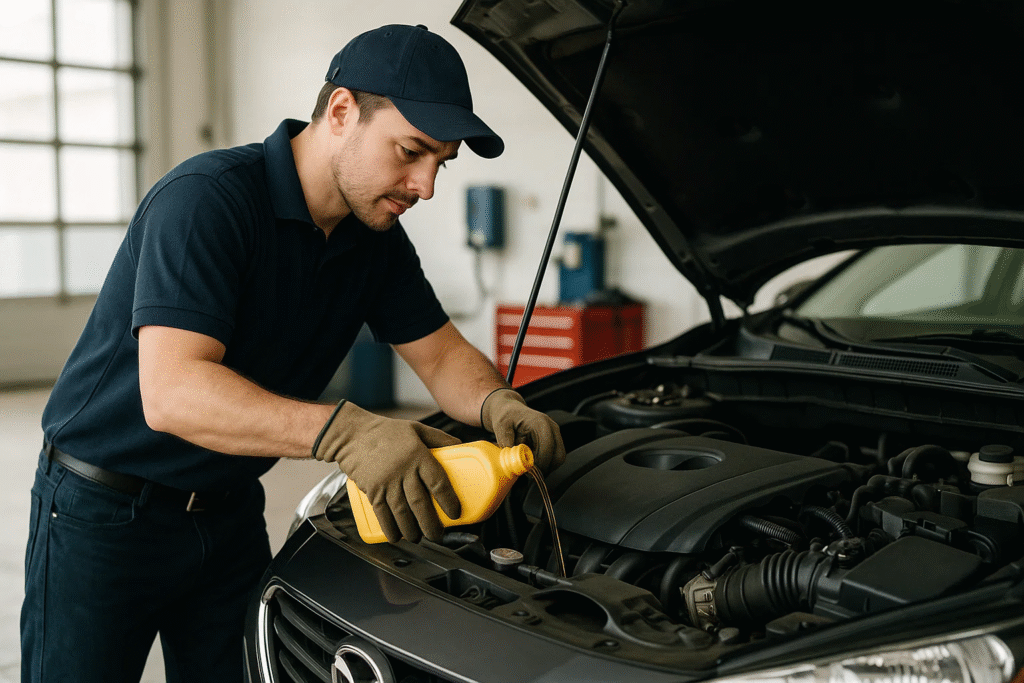
The Ultimate Guide to Car Fluids: What They Do and When to Change Them
As a car owner, one of the most important aspects of vehicle maintenance is making sure your car’s fluids are in good condition. Fluids are the lifeblood of your car, ensuring it runs smoothly, performs well, and avoids major mechanical issues. Understanding what each fluid does, why it’s essential, and when to change it can save you time, money, and potential headaches.
With years of experience in the automobile industry and mechanical expertise, I’m here to break down each essential fluid in your vehicle, explain their purpose, and guide you on when and how to take care of them.
1. Engine Oil: The Heartbeat of Your Car’s Engine
What It Does:
Engine oil plays a pivotal role in keeping your car’s engine working efficiently. It lubricates the engine’s moving parts, reduces friction, and helps to cool the engine by absorbing heat. Additionally, oil acts as a cleaner by capturing debris, dirt, and contaminants, preventing them from causing damage to the engine components.
Why It’s Critical:
If you neglect to change the engine oil, it can become dirty and thick, reducing its ability to perform these essential tasks. Over time, this leads to engine overheating, excessive wear, and, eventually, costly engine failure.
When to Change It:
Most car manufacturers recommend changing engine oil every 3,000 to 7,500 miles. However, if you drive under extreme conditions such as heavy stop-and-go traffic, long periods of idling, or harsh weather, more frequent changes might be necessary. Always refer to your car’s manual for specific intervals and recommendations.
Pro Tip: If you notice that the oil looks dark or gritty, it’s time for a change. Also, never ignore the “oil change” light on your dashboard—it’s there for a reason!
2. Transmission Fluid: Ensuring Smooth Shifting
What It Does:
Transmission fluid ensures that your car’s transmission system operates smoothly. It lubricates the moving parts within the transmission, preventing overheating, friction, and premature wear. It also helps to maintain proper pressure, which is critical for the car’s shifting system to work as intended.
Why It’s Critical:
Low or dirty transmission fluid can lead to jerky gear shifts, slippage, and overheating, all of which can eventually cause complete transmission failure—a very costly repair.
When to Change It:
Transmission fluid generally needs to be changed every 30,000 to 60,000 miles, but this varies based on the type of vehicle and driving conditions. Always consult your car’s manual for manufacturer-specific recommendations.
Pro Tip: If your car’s transmission begins to shift roughly or if you hear grinding noises, it might be time to check and replace the transmission fluid.
3. Brake Fluid: Your Car’s Safety Lifeline
What It Does:
Brake fluid is essential for the proper functioning of your car’s braking system. It transfers the force from the brake pedal to the brake pads, enabling them to slow or stop the vehicle. Brake fluid also helps to maintain hydraulic pressure in the brake system.
Why It’s Critical:
Old or contaminated brake fluid can lead to a loss of braking power, as it can absorb moisture over time, reducing its effectiveness. This can result in a soft or spongy brake pedal and, in severe cases, brake failure.
When to Change It:
Brake fluid should be replaced every 2 years or 24,000 miles, though you should check the level more often to ensure it is not running low. It’s also a good idea to check for discoloration or cloudiness, which indicates that the fluid needs to be changed.
Pro Tip: If you notice that your brakes feel less responsive or your brake pedal is unusually soft, have your brake fluid checked immediately. Don’t wait until it becomes a bigger safety issue.
4. Coolant/Antifreeze: Keeping Your Engine Temperature in Check
What It Does:
Coolant, also known as antifreeze, keeps your engine from overheating in hot conditions and prevents freezing during cold weather. It circulates through the radiator and absorbs heat from the engine, ensuring that it stays at an optimal temperature.
Why It’s Critical:
Without enough coolant or with degraded coolant, your engine can overheat, which can cause severe damage, such as a blown gasket or cracked cylinder head.
When to Change It:
Coolant should be replaced every 30,000 to 60,000 miles or every 2 to 4 years, depending on the type of coolant. Always use the coolant type specified by the manufacturer to avoid corrosion in the engine.
Pro Tip: If you see steam coming from under the hood or notice your engine temperature gauge rising above normal, pull over safely and check the coolant levels. Regularly topping up coolant can prevent overheating issues.
5. Power Steering Fluid: Smooth Handling at Your Fingertips
What It Does:
Power steering fluid helps to make steering your vehicle easier by reducing the effort needed to turn the wheel. It lubricates the power steering pump and ensures that the hydraulic system works effectively, making your steering feel smooth and responsive.
Why It’s Critical:
If power steering fluid is low or contaminated, the steering system may become difficult to operate, and the steering wheel may feel stiff or unresponsive. In some cases, low fluid can cause damage to the power steering pump.
When to Change It:
Power steering fluid should be checked and replaced every 50,000 miles, or as needed. If you notice that the fluid looks dark or gritty, it’s time for a change.
Pro Tip: If your steering feels unusually heavy or you hear whining sounds when turning, it’s a sign that your power steering fluid might be low or the system could be malfunctioning.
6. Windshield Washer Fluid: Clear Vision in All Conditions
What It Does:
Windshield washer fluid keeps your windshield clean by removing dirt, bugs, and other debris. This ensures clear visibility during your drive, especially in adverse weather conditions like rain, snow, or fog.
Why It’s Critical:
Without adequate washer fluid, your windshield can get obscured by dirt or grime, reducing visibility and creating a safety hazard.
When to Change It:
Windshield washer fluid doesn’t have a set replacement interval, but you should always keep the reservoir topped off, especially before long trips or during seasonal changes.
Pro Tip: Always use the appropriate washer fluid for your climate. Winter fluids prevent freezing, while regular fluids are better for cleaning off dirt and bugs.
7. Differential Fluid: Important for Smooth Power Transfer

What It Does:
Differential fluid lubricates the components of your vehicle’s differential system, which is responsible for distributing power to the wheels. It ensures smooth handling, particularly in all-wheel-drive and four-wheel-drive vehicles.
Why It’s Critical:
The differential system is constantly in motion when driving, and without proper lubrication, it can wear down quickly, leading to grinding noises or potential failure.
When to Change It:
Differential fluid should be replaced every 30,000 to 60,000 miles, especially if you frequently drive in rough conditions or tow heavy loads.
Pro Tip: If you hear grinding noises coming from the rear of the car, or if the handling feels off, it may be a sign that the differential fluid needs to be replaced.
Conclusion: Fluid Maintenance is Key to Longevity
Proper fluid maintenance is one of the simplest yet most effective ways to ensure the longevity and reliability of your car. Keeping your fluids at the proper levels and replacing them at the recommended intervals will help maintain your vehicle’s performance, reduce the risk of major breakdowns, and ensure that your car runs efficiently for many years to come.
Regularly checking and replacing fluids isn’t just about preventing problems—it’s about maximizing the lifespan of your car and ensuring that it continues to perform at its best. Always consult your car’s manual for specific recommendations regarding fluid types and maintenance schedules.
By taking a proactive approach to fluid care, you’re not just avoiding expensive repairs; you’re also investing in the long-term health of your vehicle.











